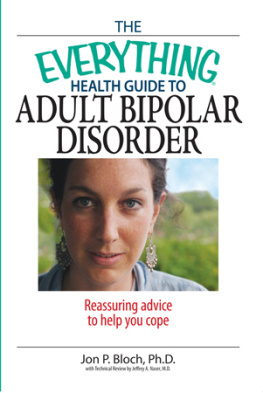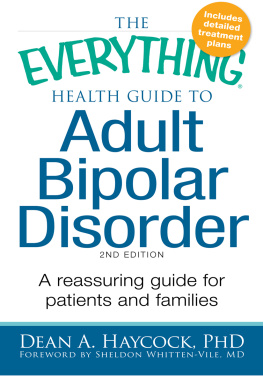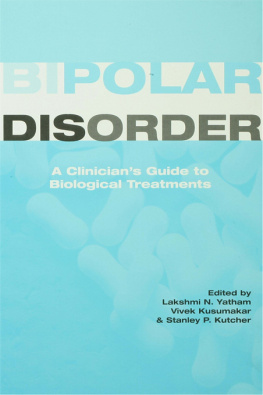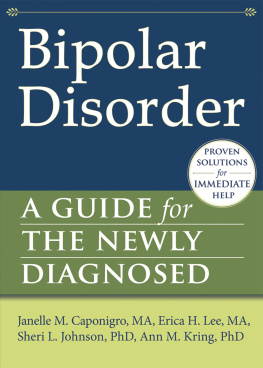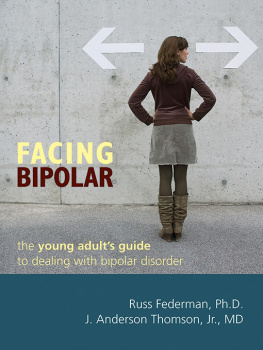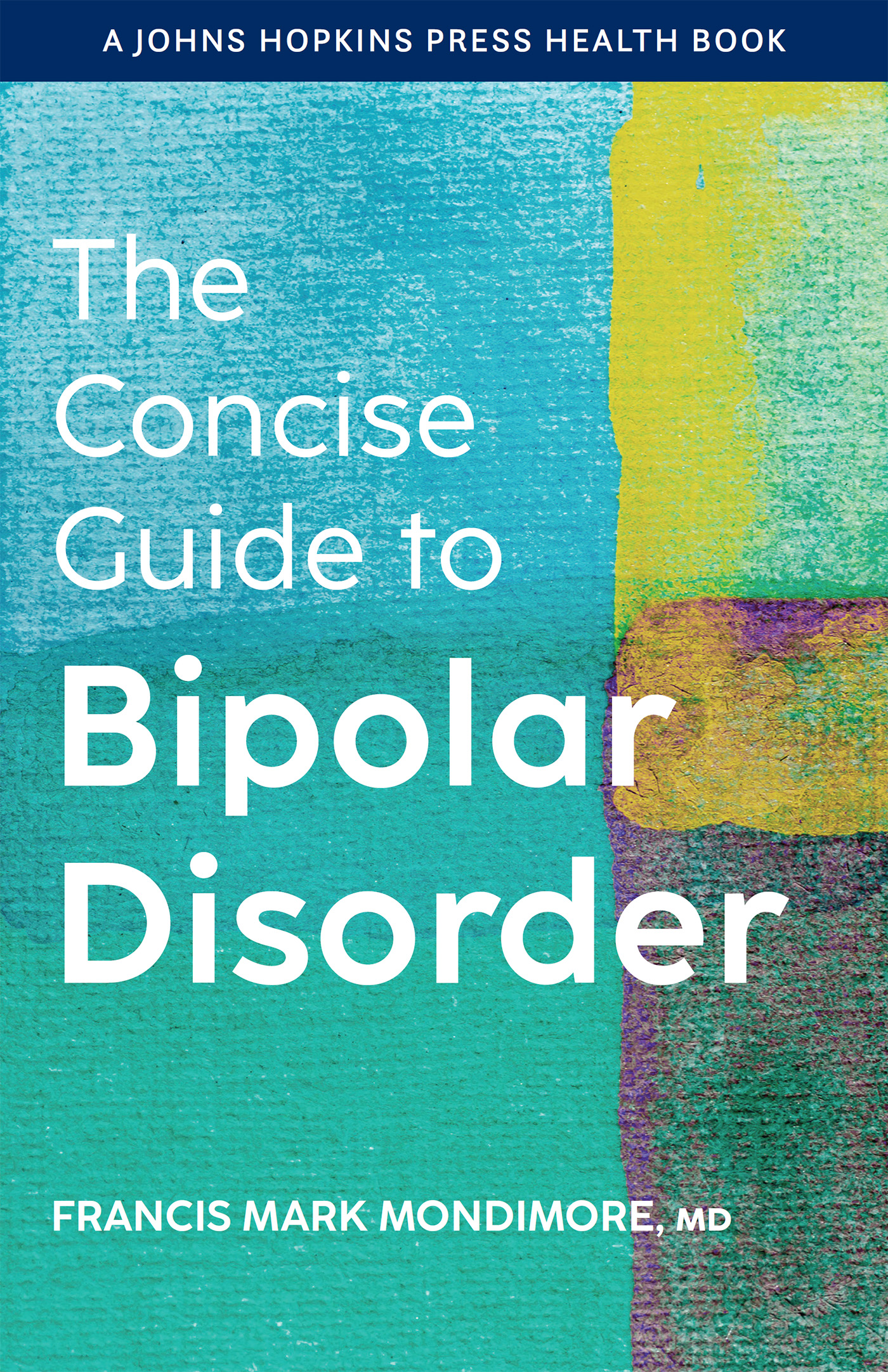Contents
Guide
THE CONCISE GUIDE TO
Bipolar Disorder
A JOHNS HOPKINS PRESS HEALTH BOOK
THE CONCISE GUIDE TO
Bipolar Disorder
Francis Mark Mondimore, MD

Johns Hopkins University Press
Baltimore
Note to the Reader: This book is not meant to substitute for medical care, and treatment should not be based solely on its contents. Instead, treatment must be developed in a dialogue between the individual and their physician. This book has been written to help with that dialogue.
Drug dosage: The author and publisher have made reasonable efforts to determine that the selection of drugs discussed in this text conform to the practices of the general medical community. The medications described do not necessarily have specific approval by the US Food and Drug Administration for use in the diseases for which they are recommended. In view of ongoing research, changes in governmental regulation, and the constant flow of information relating to drug therapy and drug reactions, the reader is urged to check the package insert of each drug for any change in indications and dosage and for warnings and precautions. This is particularly important when the recommended agent is a new and/or infrequently used drug.
2022 Johns Hopkins University Press
All rights reserved. Published 2022
Printed in the United States of America on acid-free paper
2 4 6 8 9 7 5 3 1
Johns Hopkins University Press
2715 North Charles Street
Baltimore, Maryland 21218-4363
www.press.jhu.edu
Library of Congress Cataloging-in-Publication Data
Names: Mondimore, Francis Mark, 1953 author.
Title: The concise guide to bipolar disorder / Francis Mark Mondimore, MD.
Description: Baltimore : Johns Hopkins University Press, 2022. | Includes bibliographical references and index.
Identifiers: LCCN 2021039029 | ISBN 9781421443898 (hardcover) | ISBN 9781421444031 (paperback) | ISBN 9781421444048 (ebook)
Subjects: LCSH: Manic-depressive illness Popular works. | Manic-depressive illness Treatment Popular works.
Classification: LCC RC516 .M635 2022 | DDC 616.89/5dc23
LC record available at https://lccn.loc.gov/2021039029
A catalog record for this book is available from the British Library.
Special discounts are available for bulk purchases of this book. For more information, please contact Special Sales at .
Preface
You or a loved one has recently been diagnosed with bipolar disorder, and you want some information now. You may be thinking, I cant handle too much detail just yet, but I need to understand the basicsand fast. I wrote this book for you.
- will tell you what you need to know about the illness itself: its symptoms, the different forms it can take, and how psychiatrists diagnose bipolar disorder.
- will tell you about treatments. There are chapters on the different types of medications we prescribe. I will discuss a group of treatment interventions that together are called brain stimulation treatments. These treatments use tiny electrical impulses to stimulate brain areas. Next, Ill discuss the different types of psychotherapy, including talk therapy, which is such an essential aspect of treatment.
- lays out what you can do to stay well. This includes lifestyle changes and healthy habits that research has shown can help minimize symptoms and maximize healthy time. Ill discuss how to prepare for emergencies and also share recommendations especially meant for family members.
- is about the causes of bipolar disorder and discusses how treatments work. Its content is more scientific, and these chapters may be considered optional reading. However, I urge you not to skip them. Its a lot easier to put your treatment teams recommendations into place if you know a little about the science behind them.
- is a short chapter that looks ahead and discusses research into the illnesss causes and the quest for new and better treatments.
About two percent of the population suffers from some form of bipolar disorder. If that statistic is broadened, however, to include milder forms of the illness, known as soft bipolar conditions, then that number rises to nearly five percent.
Clinical research has shown again and again that many relapses of bipolar disorder occur not because of medication failure but rather because people stop taking medication and drop out of treatment. Perhaps they dont understand that relapse and repetition of illness episodes are hallmarks of the disease, that abruptly stopping medication is especially risky, that medication side effects can often be treated or controlled, and that new medicines are becoming available all the time. I hope this book helps those who face difficult treatment decisions to make well-informed and intelligent choices.
A survey of individuals with bipolar disorder and other mood disorders, carried out by the National Depressive and Manic-Depressive Association (now known as the Depression and Bipolar Support Alliance) in the early 1990s, found that thirty-six percent of those who responded to the survey had not sought professional treatment until more than ten years after their symptoms had begun. Of the people with bipolar disorder in this study, seventy-three percent had received at least one incorrect diagnosis before being identified as having bipolar disorderoften many years after first seeking help. The average respondent had seen 3.3 physicians before being correctly diagnosed. Another study, done in 2017, showed only a small improvement in the length of time it took people with bipolar disorder to get into treatment: the number of years had dropped from ten to just under six.
Why is this illness so difficult to identify correctly? One reason is that the most severe form of the illnesscalled bipolar I disorderis both easily diagnosed and just one of the several forms this chameleon disorder can take. Bipolar I, in fact, is probably less common than the milder forms, in which symptoms of mild depression and subtle mood swings may be the only manifestations. We are realizing that many people with these milder forms of the disorder also benefit from treatment with mood-stabilizing medications. But they can do so only when they seek treatment and are correctly diagnosed.
Winston Churchill, George Frideric Handel, Lord Byron, Virginia Woolf, Edgar Allan Poe, Napoleon Bonaparte, and Vincent van Gogh are a few of the politicians, writers, artists, and musicians who, despite having bipolar disorder, left their mark of greatness upon the world. In our own time, musical sensation Mariah Carey, Star Wars actress Carrie Fisher, and television anchor and journalist Jane Pauley have acknowledged being diagnosed with bipolar disorder. The list could go on and on.
Most people who are affected by this illness, however, are just ordinary human beings who want nothing more than to get back to their everyday lives after they or their family members have been diagnosed with the disorder.
By picking up this book, you have already taken an essential step toward getting better and staying wellor helping your loved one do so. Numerous research studies have shown that people who get educated about the illness do better. They have fewer relapses, spend less time struggling with symptoms, and have higher social and occupational functioning levels. By facing the illness straight on and deciding to learn about it, you have already increased your chances of doing well.


